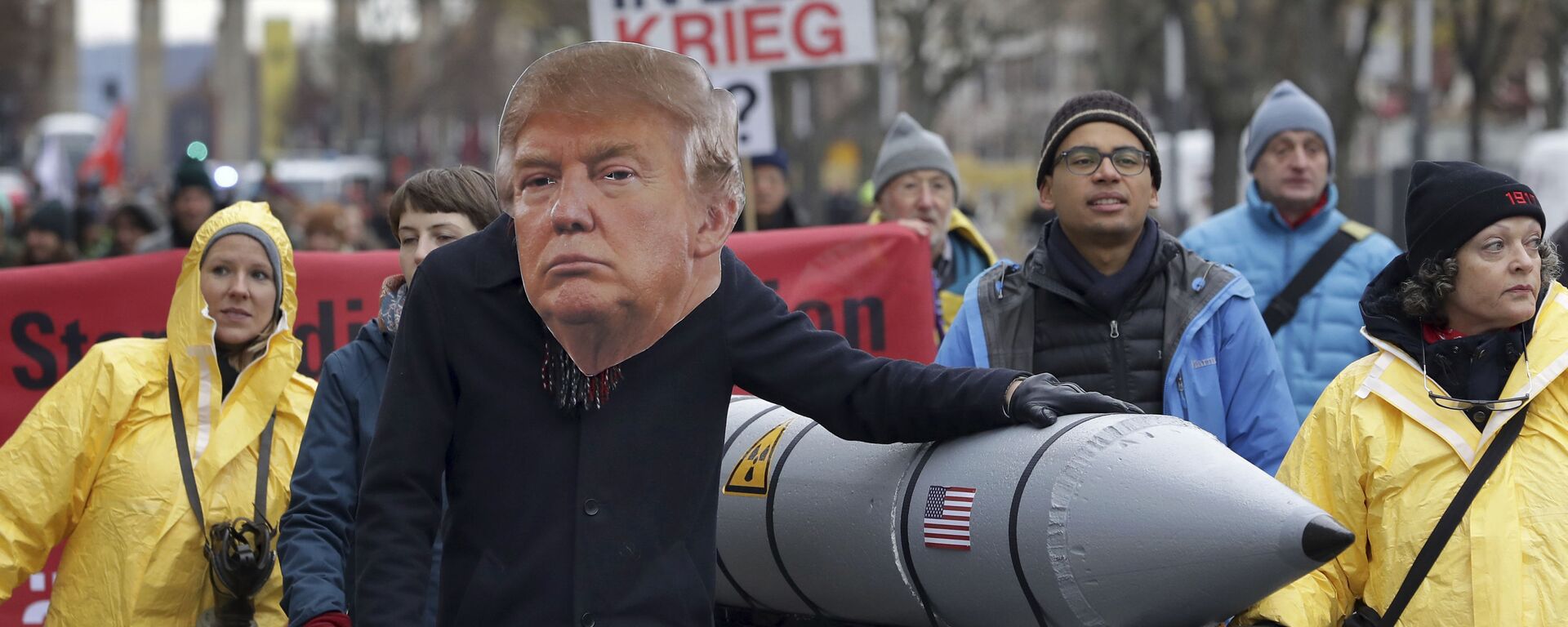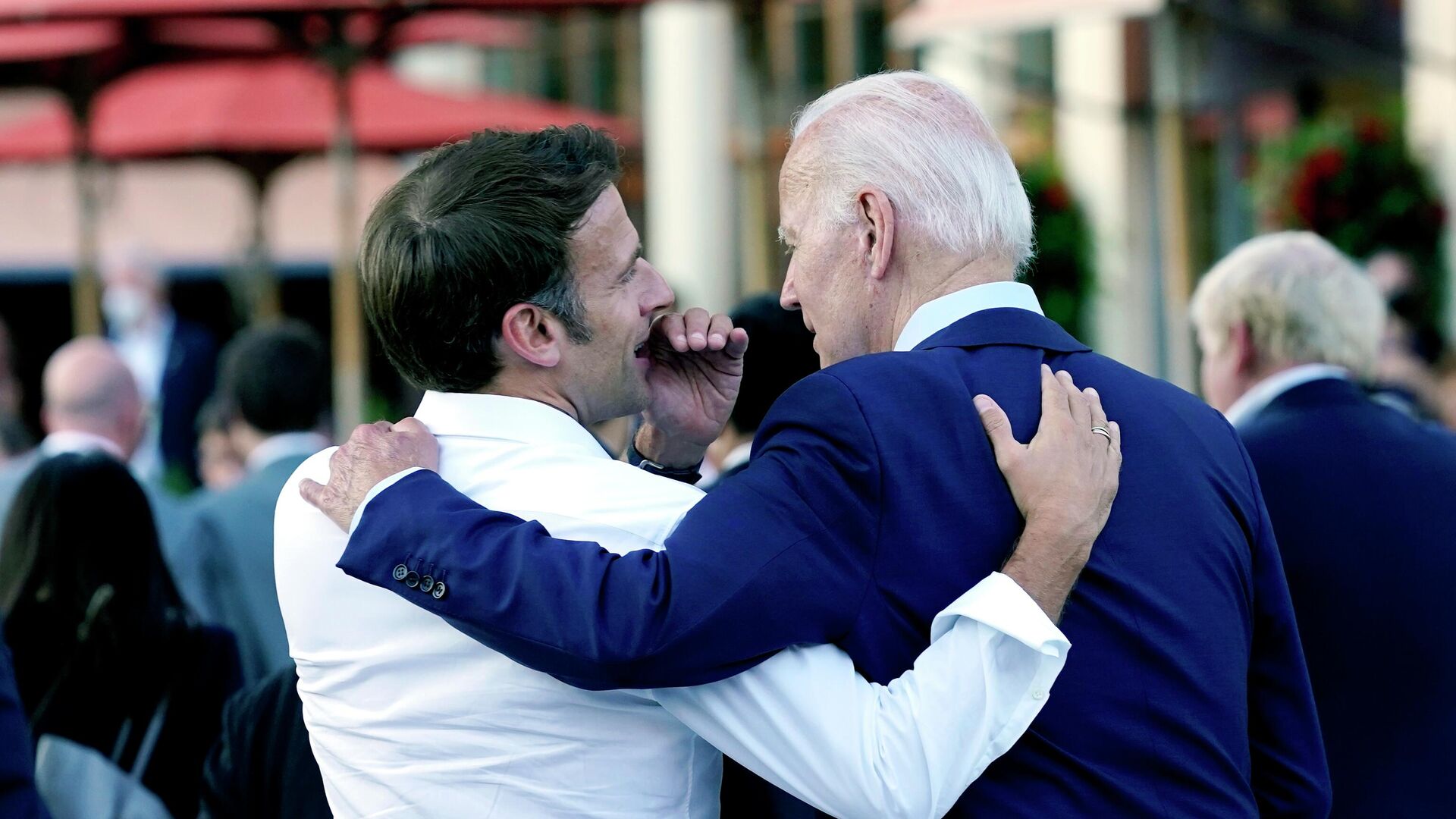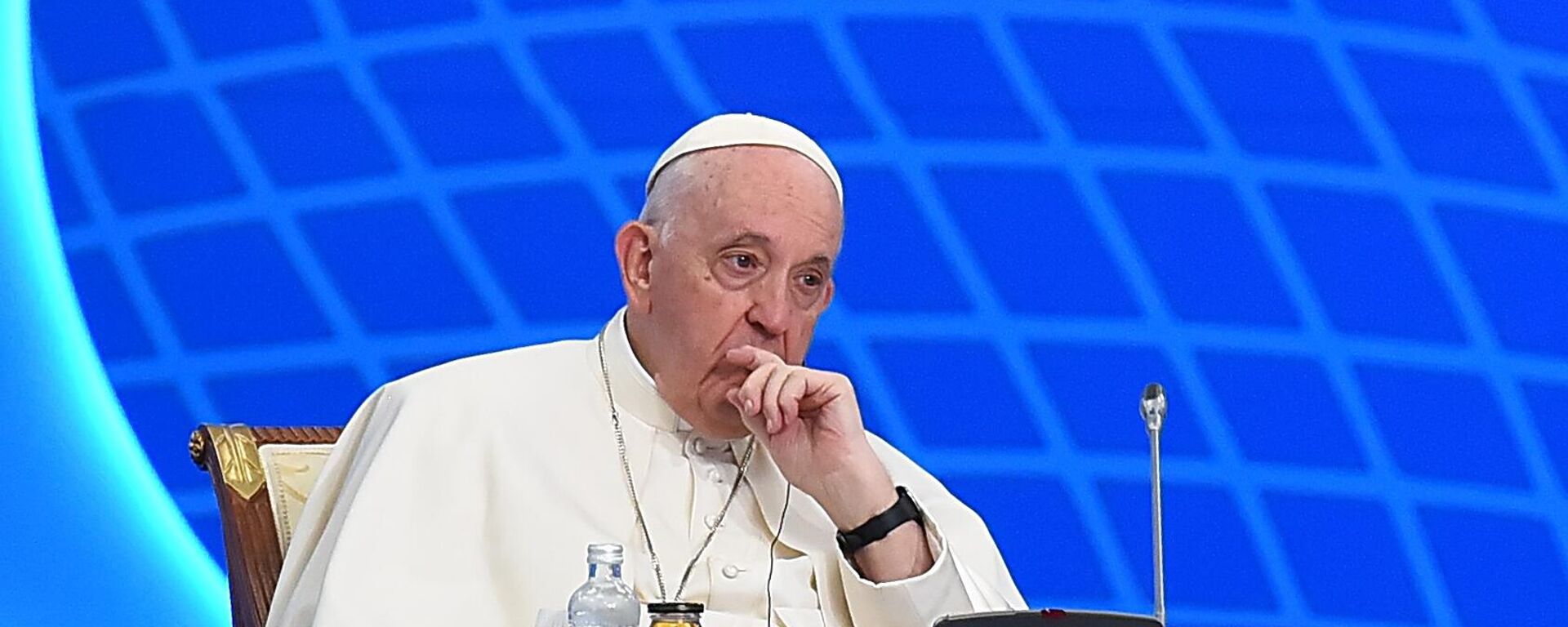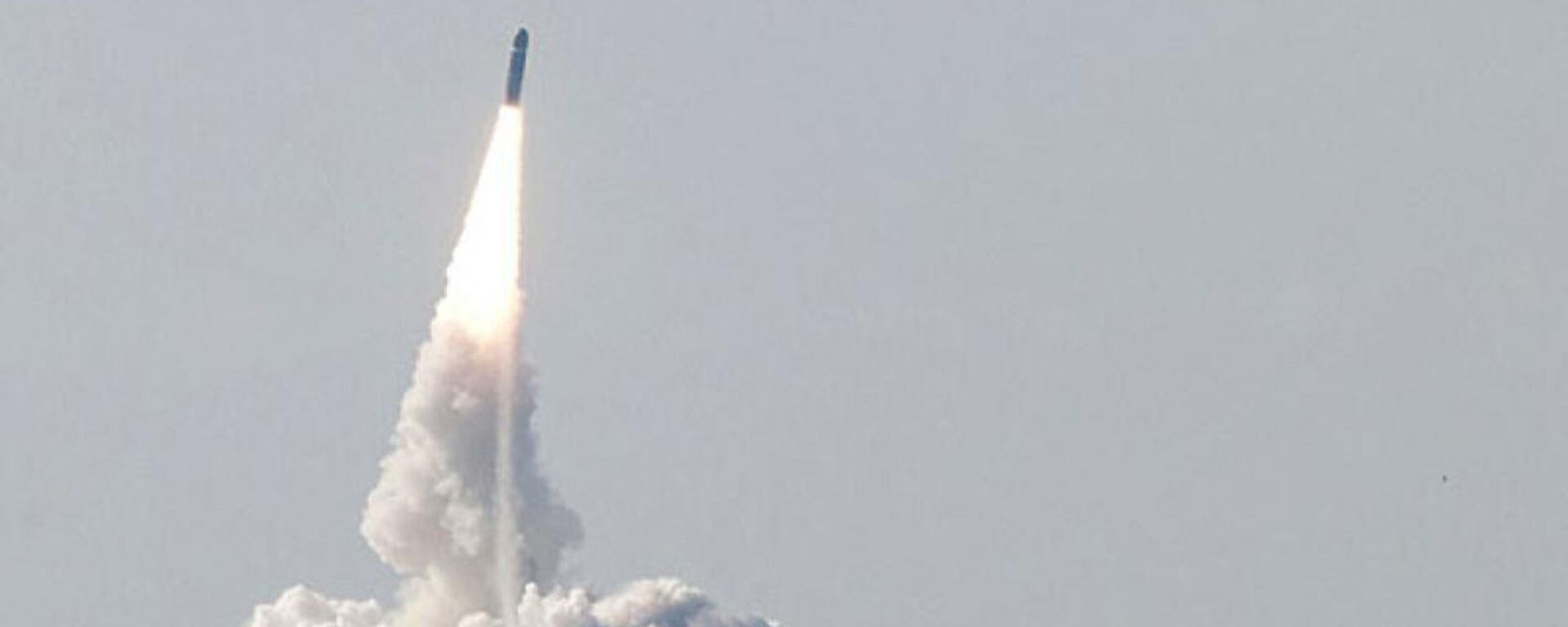https://sputnikglobe.com/20240311/abandonment-issues-what-macrons-verbal-bravado-on-ukraine-conceals-1117270534.html
Abandonment Issues: What Macron’s ‘Verbal Bravado’ on Ukraine Conceals
Abandonment Issues: What Macron’s ‘Verbal Bravado’ on Ukraine Conceals
Sputnik International
In the wake of his explosive remarks late last month about “not ruling out” sending NATO troops to Ukraine, the French president has scheduled and repeatedly postponed traveling to Kiev. Sputnik asked a Europe-based foreign affairs observer about what’s behind the French leader’s ‘tough guy’ posture, and what it may secretly conceal.
2024-03-11T18:43+0000
2024-03-11T18:43+0000
2024-03-11T18:58+0000
analysis
emmanuel macron
donald trump
sebastien lecornu
ukraine
russia
france
nato
https://cdn1.img.sputnikglobe.com/img/07e6/06/1b/1096701960_0:0:3073:1728_1920x0_80_0_0_0d4593049bffc5dcfd87443fd0a584a4.jpg
The Elysee Palace confirmed Sunday that President Emmanuel Macron would be postponing a planned visit to Ukraine which was expected to take place later this week to some time in “the coming weeks.” This is the third time in a month that Macron has pushed backed the trip, for reasons which remain unclear.Macron made headlines in late February after hinting at the possibility of NATO troops being deployed in Ukraine to fight Russia, with Paris gradually walking back those remarks after a major backlash both in France and among other members of the NATO alliance.“There were hypotheses clearly put on the table but not combat ground troops as may have been said here or there,” French Defense Minister Sebastien Lecornu assured in an interview with French television late last week, implying that Macron had been misunderstood.“Macron’s verbal bravado proves the French leader is trying to be more Catholic than the Pope,” Adriel Kasonta, a London-based foreign affairs analyst and journalist, told Sputnik. “However, Pope Francis advises Ukraine to sit with Russia at the negotiating table,” the commentator pointed out.Kasonta believes the loud “anti-Russian rhetoric” coming out of Paris regarding the Ukraine crisis comes in large part out of terror among European elites over the prospects of Donald Trump returning to power in November and somehow “disrupting” transatlantic security bonds.“European officials are concerned that a Trump presidency will disrupt NATO, which is the main reason why we see discussions about the possibility of putting NATO troops on the ground in Ukraine, and the prism of further escalation,” the observer explained. “Europe is concerned that if the US abandons it, it could become vulnerable to a possible Russian ‘invasion’. Therefore, European leaders are making empty threats directed towards Moscow.”Ultimately, Kasonta believes that the “danger of this paranoia,” which has been “fueled by years of propaganda” against Russia poses a real threat of escalating into a hot war – possibly even going nuclear, if not tamped down.Baltic leaders have praised Macron’s “outside of the box” thinking on the prospect of Western troops in Ukraine. “What Macron is reminding everyone and bringing again to the forefront is the sense of urgency. This is what is needed,” Latvian Foreign Minister Krisjanis Karins said in a joint press conference with his Lithuanian, Estonian and Ukrainian counterparts last week.
https://sputnikglobe.com/20240310/pope-francis-urges-zelensky-to-save-lives-find-courage-to-end-conflict-1117235173.html
https://sputnikglobe.com/20240229/germany-mulls-re-obtaining-nuclear-arms-names-trump-among-reasons-1117063031.html
https://sputnikglobe.com/20240311/eu-nuclear-umbrella-to-embolden-member-states-to-use-french-nukes-politician-warns-1117251223.html
ukraine
russia
france
Sputnik International
feedback@sputniknews.com
+74956456601
MIA „Rossiya Segodnya“
2024
News
en_EN
Sputnik International
feedback@sputniknews.com
+74956456601
MIA „Rossiya Segodnya“
Sputnik International
feedback@sputniknews.com
+74956456601
MIA „Rossiya Segodnya“
why is france not ruling out troops in ukraine, why is europe terrified of trump presidency
why is france not ruling out troops in ukraine, why is europe terrified of trump presidency
Abandonment Issues: What Macron’s ‘Verbal Bravado’ on Ukraine Conceals
18:43 GMT 11.03.2024 (Updated: 18:58 GMT 11.03.2024) In the wake of his explosive remarks late last month about “not ruling out” sending NATO troops to Ukraine, the French president has scheduled and repeatedly postponed traveling to Kiev. Sputnik asked a Europe-based foreign affairs observer what may be behind the French leader’s ‘tough guy’ posture, and what it secretly conceals.
The Elysee Palace confirmed Sunday that President Emmanuel Macron would be postponing a planned visit to Ukraine which was expected to take place later this week to some time in “the coming weeks.” This is the
third time in a month that Macron has pushed backed the trip, for reasons which remain unclear.
Macron made headlines in late February after hinting at the possibility of NATO troops being deployed in Ukraine to fight Russia, with Paris gradually walking back those remarks after a major backlash both in France and among other members of the NATO alliance.
“There were hypotheses clearly put on the table but not combat ground troops as may have been said here or there,” French Defense Minister Sebastien Lecornu
assured in an interview with French television late last week, implying that Macron had been misunderstood.
“But between the transfer of arms and co-belligerence – in other words direct war with Russia – have we done everything within that space? Are there paths that we can explore? And notably paths involving a military presence Lecornu asked, suggesting that Kiev should conscript even more troops and “ramp up training” instead of expecting the West to come to its rescue.
“Macron’s verbal bravado proves the French leader is trying to be more Catholic than the Pope,” Adriel Kasonta, a London-based foreign affairs analyst and journalist, told Sputnik. “However, Pope Francis advises Ukraine to sit with Russia at the negotiating table,” the commentator pointed out.
Kasonta believes the loud “anti-Russian rhetoric” coming out of Paris regarding the Ukraine crisis comes in large part out of terror among European elites over the prospects of Donald Trump returning to power in November and somehow “disrupting” transatlantic security bonds.
“European officials are concerned that a Trump presidency will disrupt NATO, which is the main reason why we see discussions about the possibility of putting NATO troops on the ground in Ukraine, and the prism of further escalation,” the observer explained. “Europe is concerned that if the US abandons it, it could become vulnerable to a possible Russian ‘invasion’. Therefore, European leaders are making empty threats directed towards Moscow.”
“On the one hand, this is an attempt to demonstrate to Trump and his supporters that Europe, under French-self-proclaimed leadership, is ‘stepping up’ and being a reliable partner. On the other hand, Europe has put itself in a position where it feels compelled to escalate further to save face. If they do not, it would mean that everything they have said and the economic turmoil they have created” (by cutting off economic ties with Russia) “was entirely unnecessary,” Kasonta said.
Ultimately, Kasonta believes that the “danger of this paranoia,” which has been “fueled by years of propaganda” against Russia poses a real threat of escalating into a hot war – possibly even going nuclear, if not tamped down.

29 February 2024, 22:55 GMT
“Some, like Germany and Finland, seem to want to avoid risking our planet’s survival. That’s why France decided to build an ‘alliance of the willing’ in the Baltics and Poland, nations traditionally known for their anti-Russian stance,” the journalist said, referring to Paris’ efforts to drum up support for its hostile rhetoric in Eastern Europe amid a backlash from France’s Western European allies.
Baltic leaders have praised Macron’s
“outside of the box” thinking on the prospect of Western troops in Ukraine. “What Macron is reminding everyone and bringing again to the forefront is the sense of urgency. This is what is needed,” Latvian Foreign Minister Krisjanis Karins said in a joint press conference with his Lithuanian, Estonian and Ukrainian counterparts last week.





